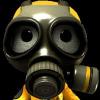Featured





 2 votes
2 votes
Spotlight: Designing Sounds for IA!
Posted by bnuh
in
Spotlights
on 17 February 2012
·
3919 views
Development Audio Sound

One of our primary goals is to create a unique world for Intruder Alert!, a world which will come to life in the many official and community-made levels built specifically for IA!. Sounds (whether they be ambient, foley or miscellaneous effects) obviously play a very big role in animating the environment, which is why redMatter hired not one, but two experienced sound designers to work closely with the team and define IA!'s identity from an audio standpoint, ultimately creating sounds that complement the game's theme and art style perfectly. It's a unique, complex but exciting process! Luckily, the game's 60s spy thriller/parody backdrop gave us a lot of vibrant, campy, iconic and brilliant films to pick apart and mine for inspiration.
The main difficulty is balancing it all - keeping the tongue-in-cheek fun without losing the risk and danger - so we've had to pick and choose, taking a lot of our style cues from the modern hyperrealism of Hollywood (in order to keep the action full-featured, cutting edge and engaging), while maintaining the fun mechanical gadgetry and classic lo-fi futuristic sound design of films like Moonraker. Our goal is to surround the exciting core game sounds in an analog world full of piezoelectric buzzers, improbable gadgets, and ticking computers the size of refrigerators.
Our first task when we joined was to create a few sounds that would serve as a sample and give the rest of the team an early taste of what's to come. Rather than showcasing the sounds individually, we decided it would be much more interesting (and much more useful) to organize the tracks together in a sound reel: an audio run-through of the hidden base/mountain level found in IA!'s first concepts. That sound reel was released to the public as part of a news post just under a month ago (All Is Not What It Seems!). It was a hit, which is why we've since been working on a better and longer version that will be featured in IA!'s first teaser trailer, set for release in the coming weeks!
In this Spotlight, we'll be describing our process for designing, recording and editing the sounds we've created for that video.
Note that some of the sounds described below may not be included in the final cut of the teaser but may eventually be used in the game itself.
→ Parachute


Kolbias: There's an interesting process that I go through when it comes to sound design, as I have to be very resourceful and creative to be able to put together so many different sounds in a short time frame. For the parachute sound, I could have grabbed an actual chute but that would have been both time consuming and insanely impractical (I doubt my home studio is big enough for me to flail around a full-sized parachute and record the sound it makes). When it comes to sounds like these, I try to find items that are easier to procure and work with. I'm not sure if you've guessed by now but the parachute sound isn't a parachute at all; it's actually a bed sheet. The bed sheet was a perfect choice: it's small, easy to acquire and, most importantly, creates the right sound. Throw in a few different layers of the sound recorded with a hint of pitch-shifting and you've got yourself a parachute sound!
→ EMP (Electromagnetic Pulse)


bnuh: I've always loved the sound of an EMP blast in games and movies, so I made it a point to push for an EMP grenade to be used in the video (the GP uses one early on to take out a robot guard and gain access to the mountain base). Because few people, if any, have heard what an EMP actually sounds like, the sound design of an EMP in popular culture is based on prior examples, and the general consensus is that the blast sounds a bit like an electrical dead space.
Since ours is in grenade form, an initial detonation that sounds like an underwater depth charge seems to fit best. To create the electromagnetic field, I used an FM synthesizer to create some pad layers giving it a nice slightly buzzing hum, and then ran it through a sub-harmonic generator to get a deep bass rumble and give the listener an overwhelming sense of density. I then restricted the stereo width and automated a modulation chorus so that, when the grenade went off, the sound of the hum sprang from the centre and became wider as it pulsed back and forth from speaker to speaker. This was combined with an initial grenade "pop" (that grounds it in a more real-world setting) and a small static discharge.
Because a robot was disabled nearby, we have a slumping foley sound created from layers of shopping carts, toasters being dropped and other fine metallic junk, and for the robot's dying moan, I took the "O" sound from a Speak & Spell, ran it through a vocoder and slowly bent the pitch to create a classic mournful robot death.
→ Rock Face Movement


Kolbias: If you've looked through any of the concept images, you'll have noticed the rock face that opens into a secret entrance to the villain's base (villains have to have a secret entrance, right?). It needed a sound. So, as with any sound I make, I first imagined what I wanted it to sound like (it's just like hearing voices in your head), but since I'd seen so many movies with scenes of large rock faces moving, it didn't take long for me to figure out exactly what I wanted.
I started with a sample of a tombstone grinding along the ground. I then pitched it down several times and layered one under the other to make its sound deeper and larger. I then used a recording of a garage door I had gotten the day before and layered it in to give it a slightly more mechanical feel. I listened to it a couple of times and noticed something was missing, so I loaded up some gravel and rock falling sounds and put them in there to make it sound a little more like the rock was shifting. At that point, all that was left to do was to throw a bit of compression and reverb on it (we put a few separate reverbs on it to give it that classic echo-y cave feel).
→ Laser Turret


bnuh: Another fictional device we needed for the clip was an automated laser turret that scours its field of vision for intruders, spins a laser-shooting minigun and blasts everything to death. Such a device likely doesn't exist (or does it?), so most of the design had to come from existing elements and some Hollywood concepts.
For the movement of the turret as it scans back and forth, I used the sounds of a heavy VCR head whirring and clicking to a stop to mimic brief movements, and a nice simple beep as its "voice", which helps the listener intuit the turret's actions. For the beep, I tried to keep it as simple as possible by using a signal generator playing two frequencies instead of creating the sound with a synthesizer.
The minigun was intended to sound like the classic chaingun from Predator (or any other contemporary action movie) but half the size and much cleaner. I wanted it to have a nicer-sounding motor, so I picked my Magic Bullet (a compact blender if you haven't seen the commercials) which has a tiny rotor that makes a nice whirr when engaged and sounds perfect when layered with an air compressor.
For the laser fire, I used a classic 808 kick drum for a nice full-bodied digital whump for the concussion of laser leaving the barrel, and side-chained that with a compressor on the whizzing motor, so on every kick the whirring is lowered so there's more dynamic range to play with. There's also a small static discharge to accompany each blast fired (because that's how I would imagine a laser would work), in addition to the basic zzzzzap. I wanted the zap itself to sound threatening but not too far from the fun "retro-future" sounds of early sci-fi movies, so to find a middle ground, I took a gunshot, compressed it, distorted it, and then ran it through a handful of playful phasers modulated by an LFO which was timed to engage with each gunfire sample.
→ Body Falls


Kolbias: SFX samples are great a lot of the time, but sometimes you'll find yourself pulling your hair out because you can't find the right one. This was the case with body falls in my sample library for some time now, so when it came to body falls for this audio teaser, I got fed up and (at the same time) incredibly creative. I needed a good body fall sound - something that included the weight and texture of a body hitting the ground - so I stuffed two pillows as well as 5 large books into an old jacket of mine and dropped the makeshift torso on the ground multiple times in different ways. I managed to create 3 minutes of great body fall sounds that were used for layers of robot falls, landing after parachuting, and a few other sections. These sounds will no doubt also come in handy for future sound design on IA!.
→ Trap Door


bnuh: At one point in our clip, a side character steps onto a trap door that opens and drops them to their lava-induced doom. Because our clip follows a character from a first-person perspective, it was difficult to simulate a sense of depth while still maintaining all of the sound cues that give the listener the appropriate information about what exactly is happening, so the tell-tale sound of a rusty metal hatch opening underfoot, a boot scuff and sudden cloth movement as the character is caught off-guard, and the sound of bubbling lava below all had to be shifted to a slight distance through some EQing and stereo width trickery.
As the hatch opens, steam escapes and a ton of long echoes accompany the hinge creak (because what good is a pit if it's not deep enough that you can let out a nice long scream on your way down?). At the bottom of the pit is the lava, which I mimicked by using a recording of a fizzing soda water. In real life, lava probably doesn't make bubbling noises, but it's been reinforced by movies so much that we just assume it does, so I pitched down the bubbling soda water and removed the higher frequencies, then used a sub-harmonic generator with some echo to give it a low-end rumble with some nice depth.
→ Robots and the Knife Sound


Kolbias: Interestingly, robots were added as a simple way to separate the OP units from the GPs (since you can only hear and not see), and they worked out great. One thing we wanted to do was a sneak attack where one robot guard is knifed. This was probably one of the more difficult sounds to create as it took a bit of thinking to figure out how to approach it. We postulated that robots might have some sort of "soft" section where the GPs would be able to stab, so I went to work slicing up soda cans with a knife and getting some decent stab sounds. Afterwards, I made the basic sound for the robot's voice powering down - it was just me making strange noises into a microphone for about twenty minutes and playing with effects until I got the sound I was looking for. Finally, I used a recording of a drill pitch-shifted up to make a movement sound for the robot (its volume was increased slowly to give the feel that the robot was getting closer).
Thanks for reading, and be sure to leave us your comments and feedback!
-- Bryan "bnuh" M. + Kolby "Kolbias" H.




 Create a custom theme
Create a custom theme













